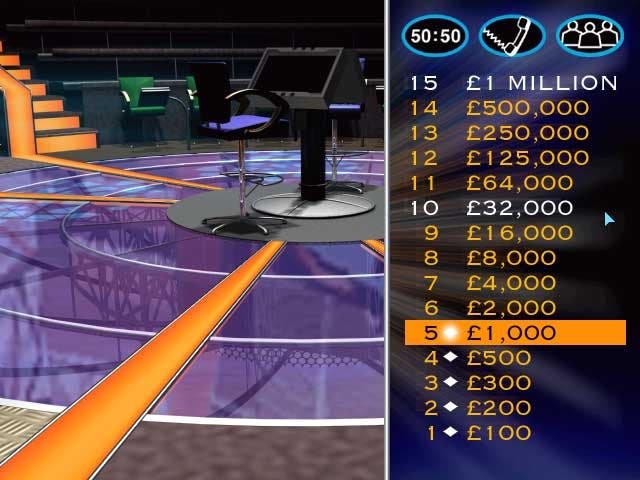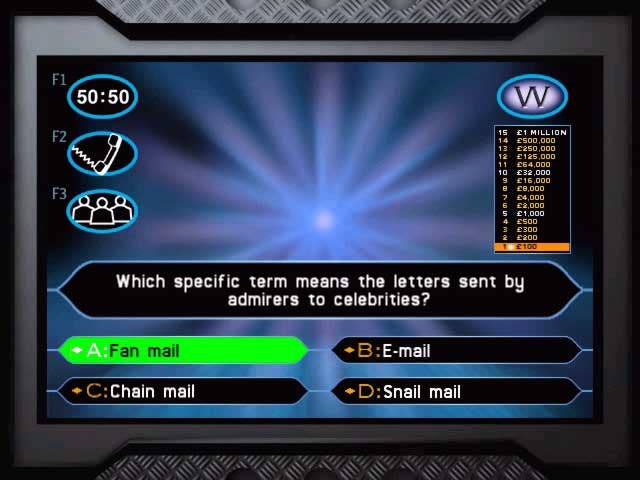Who Wants To Be A Millionaire
Review - is that your final review? Are you absolutely sure? Final review?

Show me the money
I do. I want to "be" a millionaire. I want a massive house, 17 cars, an endless supply of Smirnoff Ice, and more young ladies clamouring for a place in my will than I could possibly dream of. And the only realistic way I can attain that kind of status is through a television game show that has ensnared millions of ITV audience members like the mindless cattle that they are. But enough daydreaming about possessing untold riches (and trust me, as a writer I have to dream about money a lot), let's get on to the game where oodles of beautiful virtual cash awaits us, shall we? You should know what this game is all about by now, but for the benefit of those of you just resurrected from the dead I'll go over it for you, pointing out the video game additions as I go. A contestant enters their name and is promptly presented with their first multiple-choice question of 15, with no real messing about - Tarrant's occasionally frustrating natter is kept to a pleasant minimum, and you don't even have to look at his face. The musical score is right on par as well, and if you've ever seen the TV show you'll feel right at home as the tense ambience is recreated faithfully. As you progress past your first question, the amount of money you earn increments gradually with each successful answer until you reach your fifth, which is a kind of checkpoint. This means that whatever happens, you can leave with a minimum of £1000. This happens only once more when you win £32,000, at which point you have to either gamble big money on questions, or tap the "walk" button in order to leave with whatever amount of cash you've gained. It's around about the £1000 stage that the questions become noticeably more difficult, and the use of your lifelines come into play in order to aid you progression into double-figure sums. You have three of these lifelines at your disposal - 50:50, Phone A Friend and Ask The Audience.

Life saving
The 50:50 lifeline eliminates two of the wrong answers out of the possible four; however, the chances are it will leave behind the two answers you were pondering over the most, occasionally making life even more difficult. Phone A Friend doesn't actually let you phone a friend, but instead it plays back a pre-recorded voice (with hilariously badly acted regional accents - absolutely nobody sounds normal), which offers its opinion on your question. More often than not they are completely unsure of the answer, so you are best advised to use this up first to give you more of a chance later on. Finally, Ask The Audience is a poll of the "studio audience", where you can find out what the most likely answer to the question is. In actual fact, the developers polled 100 real people to gather the statistics for these questions, and it's by far the most useful lifeline.

Simple is as simple does
As you can tell, there's not a great deal of complication involved in playing the game, and you'll probably wonder where the longevity factor might come from. Who Wants To Be A Millionaire? is a fairly robust party game as it happens, although the boredom soon sets in when the questions begin to repeat themselves. There are just over 1000 questions in the game, but they seem to rotate alarmingly quickly, shortening the life of the title a great deal. You'd think for the PC version at least (perhaps even the Dreamcast version) there'd be the opportunity to expand the question database via a website, but a clear lack of forethought means the game will be dismissed to the cupboard within two or three weeks, easily. The differences between the three versions of the game available are purely cosmetic, with the PC version obviously offering the much more lush, higher resolution graphics, and the PlayStation stumbling in with the least impressive and frankly quite shoddy looking display. The interface, however, remains the same across the board, aside from the fact that on a television screen the text is disastrously small, forcing players to huddle around the television in order to read the questions - I really do wonder why things like this ever slip past the quality control tests. The different pseudo-multiplayer modes on offer really do little to motivate further play. There's the Fastest Finger mode whereby each player has to answer a question, putting the answers in the correct order in the quickest time possible; the fastest player goes through to play a round whilst the other sit out and.. watch. Joy. Alternatively, you can compete against other players in a kind of knockout tournament, with each player taking their turn to answer one question at a time, which is basically a more tedious version of the single-player experience - not exactly rich gameplay pickings, to be honest.
Conclusion
This game will be popular over the Christmas season, you can be assured of it, and you can also bet that a lot of families are going to feel ripped off at paying full-price for a product that only offers the limited appeal of a budget title. It's alright for a laugh when you start off, but come a couple of weeks and you'll have soon forgotten about it.

